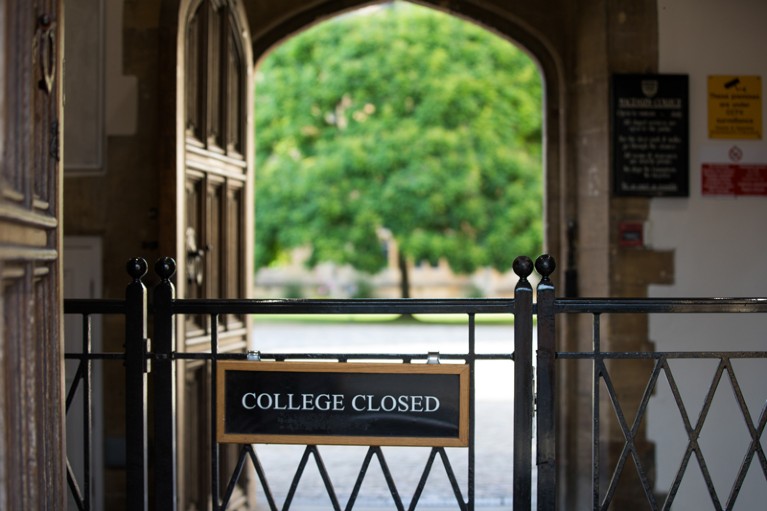
University closures and delays to research projects are stretching the finances of postdocs, Nature’s survey has found.Credit: Chris Ratcliffe/Bloomberg/Getty
The first ever Nature survey to focus on postdoctoral researchers at universities paints a gloomy picture. As we reported in September, half of respondents revealed that they had recently considered leaving academic research, in part because of concerns for their mental health.
This week, we report on other aspects of postdoc life covered by the survey. It revealed a generation of researchers who are worried about projects being shut down, having insufficient funding to support themselves for the duration of the pandemic, and the steep drop in job vacancies.
Uncertain prospects for postdoctoral researchers
In the wake of these findings, we approached around ten funding agencies and postdoctoral support organizations in the United States and Europe — home to the overwhelming majority of the survey’s self-selecting group of 7,670 respondents. We asked what they are doing to address these concerns. Those we contacted included the European Commission, the Howard Hughes Medical Institute, UK Research and Innovation (UKRI), the US National Institutes of Health and the US National Science Foundation.
Earlier in the year, many funders agreed to extend deadlines for research projects halted or delayed by the pandemic — but fewer offered extra funding to cover this period. Worryingly, most of the funders we approached still have no concrete plans to provide such additional financial support to postdocs. Many postdocs are not eligible for the government salary subsidies, or furlough schemes, that have been made available to many workers during the pandemic. Expanding access to such schemes is arguably the one intervention that could do the most to ease pressures at this time.
Financial struggles and insecurities are contributing to postdocs’ anxiety and distress, Nature’s survey reveals. Postdocs are almost always employed on short-term contracts, and the survey’s comments section featured many accounts of day-to-day struggles. Postdocs say that they are barely managing, but the urgency of their plight doesn’t seem to be getting through to decision makers.
Postdoc survey reveals disenchantment with working life
It’s not that nothing is happening. In addition to agreeing to extend project deadlines, some funders have said that they are looking at other ways to support postdocs and their career development.
The European Commission’s funding body for postdocs told Nature that it is providing grantees with access to careers advice — including advice on non-academic careers — a crucial service at a time of widespread layoffs and hiring freezes at universities. The commission says that it is also trying to find ways to make it easier for postdocs to obtain funding from other EU sources.
The United Kingdom’s main research funding body, UKRI, has previously said that it is providing some grantees, including some postdocs, with funding extensions during the pandemic. However, it was unable to respond to our request for an update on its policy by the time Nature went to press.
The United Kingdom’s research system is powered by its 45,000 postdocs — for comparison, the United States has around 80,000, but the country’s population is five times larger. UKRI is also a signatory to the 2019 Concordat to Support the Career Development of Researchers, an agreement that sets out ways to support career development and improve research culture.
Postdocs under pressure: ‘Can I even do this any more?’
The Howard Hughes Medical Institute, a philanthropic organization based in Chevy Chase, Maryland, told Nature that it will continue to pay postdocs even if labs remain shut during the pandemic. The organization has given postdocs extra time to complete projects, and has provided extra paid leave when necessary. The funder has also increased the minimum annual salary for postdocs from US$50,000 in 2019 to $51,000 in 2020 as part of an annual review.
Worldwide, the approach taken by this institution is the exception, not the rule. And although at the start of the pandemic some public funders and universities did urge governments to allow researchers to be compensated as part of furlough schemes, those calls went unheeded.
As a consequence, the research world is facing a situation where the futures of many of those in its most precarious community are hanging by a thread. As one survey respondent, a physicist in Denmark, told us: “The lack of stability in a postdoc position is a huge source of anxiety and depression.”
Governments and research funders must recognize that this urgent situation demands an urgent response. Postdocs are the future of science, and the lifeblood of the research workforce. If they don’t receive some extra financial help soon, research — and society as a whole — will bear the consequences of denying a lifeline to the next generation of researchers, inventors and innovators.

 Uncertain prospects for postdoctoral researchers
Uncertain prospects for postdoctoral researchers
 Postdocs under pressure: ‘Can I even do this any more?’
Postdocs under pressure: ‘Can I even do this any more?’
 Postdoc survey reveals disenchantment with working life
Postdoc survey reveals disenchantment with working life
 Pandemic darkens postdocs’ work and career hopes
Pandemic darkens postdocs’ work and career hopes
 Postdocs in crisis: science cannot risk losing the next generation
Postdocs in crisis: science cannot risk losing the next generation
 Seeking an ‘exit plan’ for leaving academia amid coronavirus worries
Seeking an ‘exit plan’ for leaving academia amid coronavirus worries






